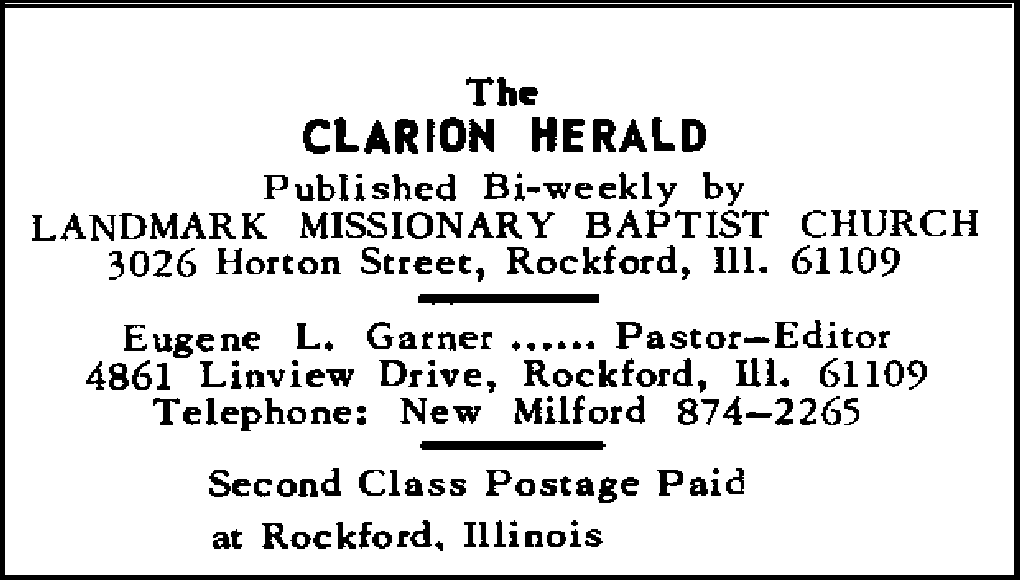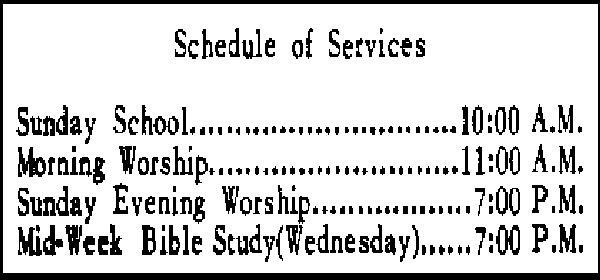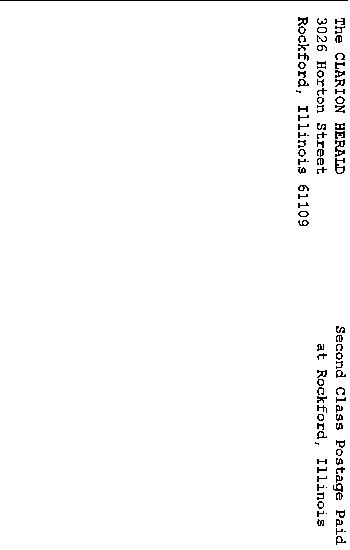
|
 |
 |
 |
|
 
|
|
|
LOVE'S QUALITY, ACHIEVEMENT
AND ENDURANCE
Surrounded by envy, strife, division and every other form of carnality, it is both refreshing and strengthening to come face-to- face with someone whose life verily radiates the love of God. So seldom is it seen -- even in the lives of men professing godliness!
Hear the words of Paul -- as they appear in the Williams Translation of I Corinthians l3:4-7:
"Love is so patient and so kind;
Love never boils with jealousy;
It never boasts, is never puffed
with pride;
It does not act with rudeness, or
insist upon its rights;
It never gets provoked, it never
harbors evil thoughts;
Is never glad when wrong is done,
But always glad when truth prevails;
It bears up under anything,
It exercises faith in everything,
It keeps up hope in everything,
It gives us power to endure in anything."
I believe it was Edward Markham who wrote:
"He drew a circle that shut me out, Heretic, rebel, a thing to flout;
But love and I had the wit to win,
We drew a circle that TOOK HIM IN."
|
|
|
|
IS LOVE THE RULE OF YOUR LIFE??
It is well that each of us honestly examine our own hearts to see if our lives are actually characterized by a "faith that worketh by love".
Do we look grudgingly upon the accomplishments and superior qualities of our friends? Or do we, in honor, prefer our brethren?
There are some insects that implant their eggs in the bodies of others. At first the intrusion appears to be relatively harmless. But the life thus inserted soon begins to develop and feed upon the body in which it dwells. It matures and strengthens itself by the total destruction of its benefactor.
So, envy drags behind itself a whole brood of evil spirits. It is the parent of malice, ill-will and division. It may at first appear harmless, but it is always potentially destructive. It can be overcome ONLY by LOVE.
If there was ever a time, in the history of New Testament churches, when God's people needed to DENY SELF -- putting away such things as envy, jealousy pride, suspicion, rudeness, etc., IT IS TODAY!!
May God truly unite our hearts to fear, love & honor His Name!
|
|
|
|
|
Page - 2
BLESSINGS, AND OPEN DOORS
Since the last CLARION HERALD was printed God has given us many blessings here at Landmark. It was a privilege to have the pastor's parents, Elder & Mrs. T. J. Garner, of Lakeland, Florida, visit with us for ten days, and to have Dad speak for us on September 22, even though he is now 80 years old.
Our hearts were filled to overflowing when Steve and Ann Schultz came, on the profession of their faith, asking to be received into our body by baptism -- and then to see them baptized, in the likeness of our Lord's burial and resurrection, in the service last Sunday.
As a special bonus, we were privileged to have Captain George Garner, (the pastors nephew, and an army Chaplain from Ft. Hood, Texas) speaking for us in both services last Sunday. His messages were truly Christ-honoring, and were a real blessing and encouragement to
|
|
|
|
our hearts.
Now, let us recognize and use the many opportunities that God is setting before us. Never, in the history of our church have there been more open doors. May we, having sought the Lord's guidance, and trusting in His strength, grasp each opportunity -- using it for the glory of His name, the salvation of precious souls and the strengthening of the body. E.G.
FLESH AND SPIRIT
Here is another of Paul's contrasts, as set forth in Romans 8. He does NOT use "flesh" as synonymous with "body" though he does often contrast "body" and "spirit", (I Thess. 5:23; I Cor. 5:3-5; 6:17; 16:18; 2 Cor. 2:13; 7:13; Col. 2:5).
"Flesh" refers to man's fallen nature -- to sinful passions. To the extent that these dwell in, or spring from, the body, the body is "flesh". But it must also be understood that to the extent they dwell in, or spring from, the mind or spirit THEY ALSO are "flesh". Paul writes of a "fleshly mind" and urges the Corinthians to a cleansing from the "filthiness of the flesh and spirit", (Col. 2:18; 2 Cor.7:l).
Paul's contrast, of flesh and spirit, is between the higher and lower elements of man -- between what is pure and what is impure. And it is evident that many of the fleshly lusts that war against the soul have their roots in our bodies (I Cor. 9:27; Rom. 8:12-13). There are sins of the body, and the more subtle sins of disposition. Both are loathsome, degrading & deadly!
|
|
|
|
|
UNSELFISH SERVICE
(A Study in Ruth 2)
The two widows, Naomi and Ruth, might have assumed a fatalist attitude and starved to death in Moab; but they were not so stupid. They might have searched out rich kinsmen and imposed on them, but they were both women of stronger character than this. They were willing to assume some responsibility.
Ruth, the Moabitess, displays an admirable quality -- a willingness, even a desire, to undertake for the welfare of her aged mother-in-law, whom she dearly loved. It is marvelous to behold the providence of God as set forth in this beautiful story, (Rom. 11:33-36).
The deep respect of Ruth for her mother-in-law is evidenced in the request she made. Impoverished and ready to perish, she did not conclude that she had made a terrible mistake in leaving Moab; rather, she asked permission to take the initiative in seeking food for their sustenance. "Let me now go into the field, and glean ears of corn after him in whose sight I shall find grace". She was willing to go wherever someone might be kind enough to permit her gleaning.
It is obvious that Naomi had taught her of God's care and provision for the poor, (Lev. 18:9-10; 23:22). Since claiming Jehovah as her God, she would avail herself of His gracious provisions. And one can almost feel the intense love and gratitude of Naomi's heart as she answers: "Go, my daughter"!
One of the most conspicuous understatements of the whole Bible
|
|
|
|
is found in verse 3; "And her hap was to light on the field belonging to Boaz". So far as Ruth was concerned, the fact that she turned into this particular field was incidental, if not accidental. But it was not accidental from God's viewpoint. Yet He accomplished His purpose without forcing either Ruth or Boaz. Ruth COULD HAVE turned into some other field. And Boaz COULD HAVE REFUSED to receive her graciously.
In unselfishly seeking the welfare of the one she loved, Ruth has seemingly stumbled upon one who has the ability to redeem both of them from their wretchedness. Boaz was a kinsman of Naomi's dead husband, Elimelech. He was a mighty man of wealth (valor). If willing, he was able to redeem the inheritance of Elimelech -- lifting the two widows from their poverty to a position of sufficiency and honor, (Lev. 25:25-28, 47-49).
Jesus Christ became our "kinsman redeemer" when He took on Himself the likeness of our flesh. The wealth of Boaz symbolizes the unsearchable riches that are available to those who put their trust in Jesus Christ, (Eph. 3:8; Phil. 4:19).
A Gentile, and a Moabitess, Ruth did not come under the benefits of the Abrahamic covenant. But as the wife of Boaz such rich benefits might be hers. If Boaz, in the book of Ruth, be regarded as a type of Christ, our kinsman redeemer (and this does seem proper, then Ruth may be considered a type of the church -- His Gentile bride.
(To be Continued)
|
|
|
|
|
SEND ME!
What was his name? I do not know
his name.
I only know he heard Gods voice
and came;
Brought all he loved across the
sea,
To live and work for God and me;
Felled the ungracious oak;
With horrid toil
Dragged from the soil
The thrice-gnarled roots and
stubborn rock;
With plenty filled the haggard
mountain side,
And, when his work was done, with-
out memorial died.
No blaring trumpet sounded out his
|
|
|
|
fame;
He lived, he died. I do not know
his name.
No form of bronze and no memorial
stones
Show me the place where lie his
mouldering bones.
Only a cheerful city stands,
Built by his hardened hands;
Only ten thousand homes.
Where every day
The cheerful play
Of love and hope and courage
comes;
These are his monuments, and these
alone, --
There is no form of bronze and no
memorial stone.
And I??
Is there some desert or some bound-
less sea
Where thou, great God of angels,
wilt send me?
Some oak for me to rend, some
sod
For me to break.
Some handful of thy corn to
take,
And scatter afar afield,
Till it in turn shall yield
Its hundred-fold
Of grains of gold.
To feed the happy children
of my God?
Show me the desert, Father, or
the sea.
Is it thine enterprise? Great God,
send me!
And though this body lies where
ocean rolls,
Father, count me among all faithful
souls.
-- Edward F. Hale
|
|
|
|
|
 |
 |
 |
|




